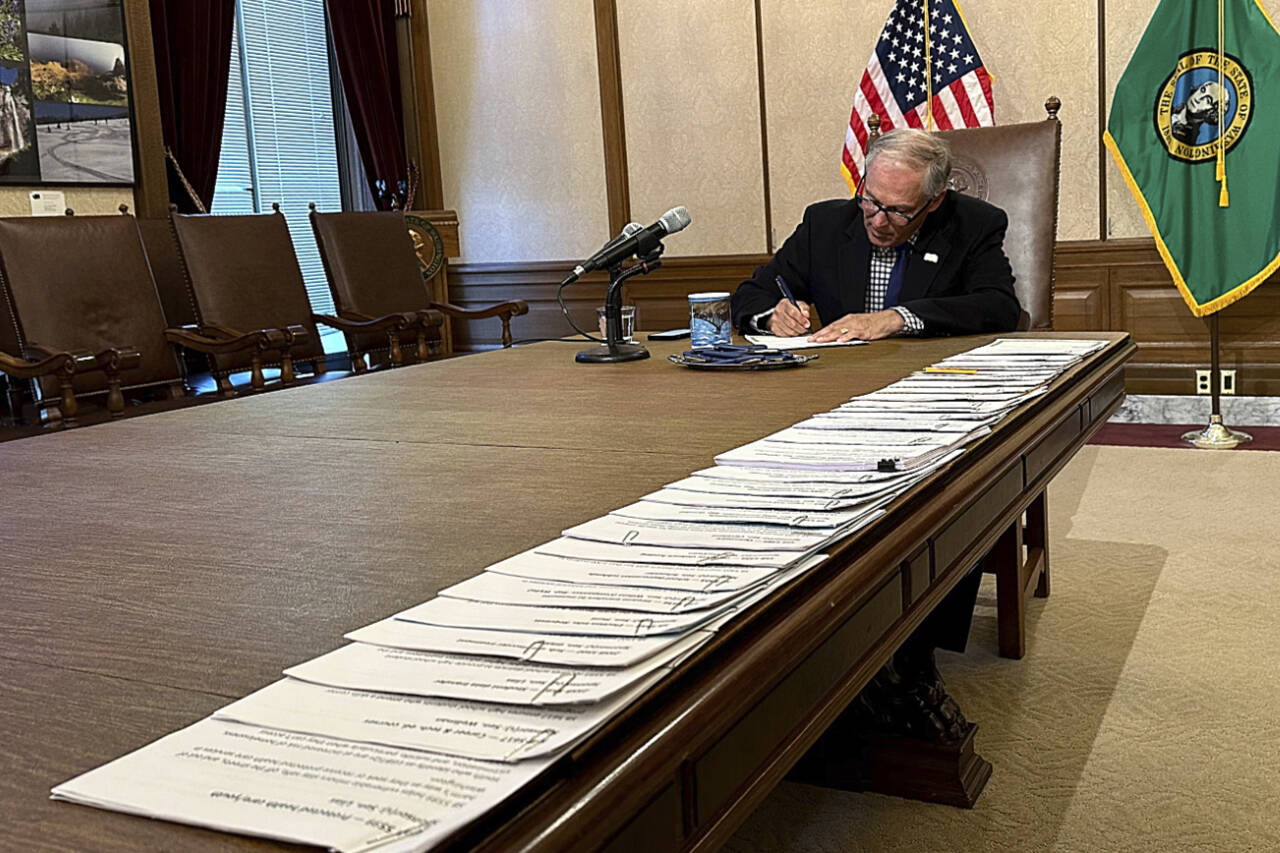By The Herald Editorial Board
Expect to be pestered soon by people holding clipboards urging you to protect the rights of parents by signing a petition to put a referendum on the November ballot.
Despite that and other claims — including one that a new law allows the “state-sanctioned kidnapping” of children from their homes — parents’ rights aren’t being threatened by the law passed by the Legislature and signed last week by Gov. Jay Inslee.
The referendum will seek to overturn Senate Bill 5599, sponsored by state Sen. Marko Liias, D-Everett, which will amend rules that shelters and the state must follow to notify parents within 72 hours when a minor checks into a youth shelter or licensed host home.
Just as the legislation was dogged by disinformation this spring while under consideration by lawmakers, the same charges are expected to be repeated as referendum supporters seek signatures, and if successful, press to overturn the law, which takes effect in July.
A rally earlier this month in Olympia, featuring about 100 protesters — and 250 counterprotesters — focused attention on the law’s added protections for transgender youths and those seeking abortions and other reproductive care who have left home, arguing that the law had trampled on parental rights.
Plainly stated, the law isn’t a threat to parental rights, but instead balances the well-being of youths who have either left or have been kicked out of their homes, assuring they have shelter and services while attempts are made to address concerns and reunify them with family.
Under current law, licensed shelters or host homes must contact a youth’s parents within 24 to 72 hours, unless there are compelling reasons, such as abuse or neglect. In those cases, the state Department of Children, Youth and Families is notified, which in turn, must make a good faith effort to notify the parents and offer behavioral health services to resolve the conflict between the youth and parents and seek reunification of the family.
The new law extends as compelling reasons issues such as a youth seeking reproductive care, such as an abortion, or a youth seeking gender-affirming care, including treatment for gender dysphoria.
The intent of the law is to ensure that youths who leave home or are kicked out of their homes can find safe and supportive shelter and services regardless of their circumstances. A reversal of the new law could mean some youths, believing they would be forced to return to their homes, would avoid shelter altogether, increasing the risks for harm and even suicide.
“We know that there’s [a] really high risk of mental health [issues] leading up to suicide for this population,” Liias told Crosscut earlier this month. “I’ve spoken to young people who have thankfully survived suicide attempts, but who share their stories of how difficult it is to live in environments where they are not just not receiving support, but their family members are actively contributing to the unsafe circumstances that led them to that place.”
About 1.8 percent of youths in the United States identify as transgender, and 1 in 3 of that group say they have attempted suicide, a report by the Trevor Project found.
Yet, groups such as the Conservative Ladies of Washington, attacked the legislation on its Facebook page, claiming it would lead to “state sanctioned kidnapping” of vulnerable children, the new Washington State Standard news service reported last week. Others claimed it would have allowed the state to remove children from parents who refused gender-affirming care for children with gender dysphoria.
To be clear, the new law makes no changes to state law on custody and makes no dictates on medical care.
The referendum signature drive is being led by a Puyallup woman, Dawn Land, the Standard reported. She and referendum supporters must gather signatures of at least 162,258 registered voters by July 22 to get the measure on the November ballot. Land was successful in 2020, gathering more than 264,000 signatures — during the pandemic — to get Referendum 90 on the ballot, which sought to repeal the state’s comprehensive sexual health education curriculum in public schools. Despite opponents’ disinformation — including labeling the curriculum as “sex ed for kindergartners” — about the law’s intent, standards and the curriculum, Washington voters sided with the new state law, voting nearly 58 percent in support.
Washington’s Legislature this session bucked the trend of unwarranted and reactionary legislation in 32 other states that sought — and too often succeeded — in restricting or banning gender-affirming care for transgender youths. That care ultimately should be a decision left to parents and youths; and when situations arise where youths and parents are estranged, the state can provide assistance to resolve the conflict.
Voters asked to sign the referendum petition should decline. Should the referendum make the ballot, they should vote to affirm the law.
Talk to us
> Give us your news tips.
> Send us a letter to the editor.
> More Herald contact information.

























